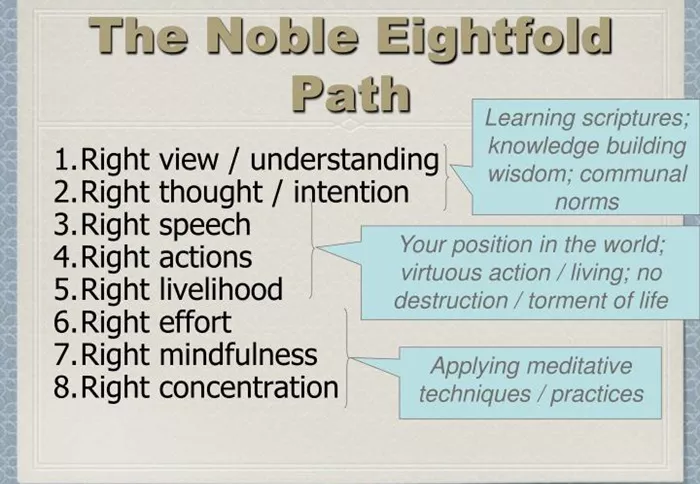The Eightfold Path is a central teaching in Buddhism, guiding followers toward a life free of suffering. It is a set of principles taught by the Buddha over 2,500 years ago. Islam, on the other hand, is a monotheistic religion founded by the Prophet Muhammad in the 7th century CE. Some people wonder if the Eightfold Path is part of Islamic teaching. This article explores this question by comparing Buddhist and Islamic beliefs, especially focusing on the Eightfold Path and its meaning.
What Is the Eightfold Path?
Definition and Purpose
The Eightfold Path is a Buddhist guide to end suffering and reach enlightenment. It consists of eight interrelated steps that help people live wisely and ethically. These steps are:
- Right View
- Right Intention
- Right Speech
- Right Action
- Right Livelihood
- Right Effort
- Right Mindfulness
- Right Concentration
These are divided into three categories: wisdom (Right View, Right Intention), ethical conduct (Right Speech, Right Action, Right Livelihood), and mental discipline (Right Effort, Right Mindfulness, Right Concentration).
The Role of the Eightfold Path in Buddhism
The Eightfold Path is the practical part of the Buddha’s teachings, called the Dharma. It is the way to stop the cycle of suffering and rebirth (samsara). By following this path, Buddhists aim to achieve Nirvana, a state of peace and freedom from desire and ignorance.
Overview of Islam and Its Teachings
Core Beliefs in Islam
Islam is based on the belief in one God (Allah) and the teachings of the Prophet Muhammad. The Quran is the holy book of Islam. Muslims follow the Five Pillars of Islam, which are:
- Shahada (faith)
- Salah (prayer)
- Zakat (charity)
- Sawm (fasting during Ramadan)
- Hajj (pilgrimage to Mecca)
Islam’s Moral and Spiritual Guidance
Islam provides detailed guidance on how to live a good and moral life. Its teachings include honesty, kindness, charity, and worship. Muslims are encouraged to develop a close relationship with God through prayer and good deeds.
Is the Eightfold Path Part of Islamic Teaching?
Historical Origins
The Eightfold Path is a teaching that originated in India with the Buddha. Islam started much later in the Arabian Peninsula. The teachings of Islam come from the Quran and the Hadith (sayings of the Prophet Muhammad).
There is no mention of the Eightfold Path in Islamic texts. The two religions developed separately with distinct goals and methods. The Eightfold Path is unique to Buddhism.
Comparing the Ethical Teachings
Both Buddhism and Islam emphasize ethics and a moral way of life. For example, both teach the importance of:
- Right speech or truthful communication
- Compassion and kindness
- Self-discipline
However, the Eightfold Path is a structured guide specific to Buddhism’s goal of enlightenment. Islamic ethics are framed within obedience to God’s commandments and the Five Pillars.
Similarities and Differences in Spiritual Practice
Both religions value meditation and mindfulness, though in different forms. Buddhism uses meditation to develop awareness and concentration. Islam uses prayer (Salah) to connect with God.
The purpose of spiritual practice in Buddhism is to end suffering by understanding the nature of reality. In Islam, spiritual practice strengthens faith and obedience to Allah.
Why the Eightfold Path Is Not Islamic Teaching
Theological Differences
Buddhism is generally non-theistic; it does not focus on a creator God. The Eightfold Path guides individuals to enlightenment through self-effort and wisdom.
Islam is strictly monotheistic, centered on worship of one God. Its teachings emphasize submission to Allah’s will, which differs from Buddhist self-guidance.
Distinct Religious Symbols and Practices
The eightfold path symbol, often shown as a wheel with eight spokes, is an important Buddhist icon. This symbol represents the path to liberation and is unique to Buddhism.
Islam uses different symbols, such as the crescent moon and star, and its practices are defined by the Quran and the Sunnah.
Conclusion
The Eightfold Path is one of the core teachings of Buddhism. It was proposed by the Buddha to guide people out of suffering and to nirvana. These eight steps cover three aspects: wisdom, moral behavior, and psychological practice. It is a path of self-cultivation that does not rely on belief in God. Islam is a strict monotheistic religion that believes in the only true God (Allah) and follows the teachings of the Quran and the Prophet Muhammad. It guides believers’ behavior and faith life through the “Five Pillars”.
Although both Buddhism and Islam value morality, honesty, compassion, and spiritual practice, the Eightfold Path is not part of Islamic doctrine. It is a system unique to Buddhism, which is completely different from the belief structure and practice of Islam. Respecting the independence and differences of the two major religions is an important step in understanding the world’s diverse faith culture.

